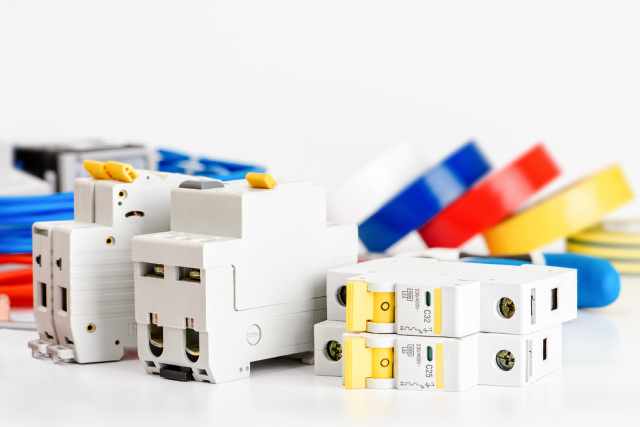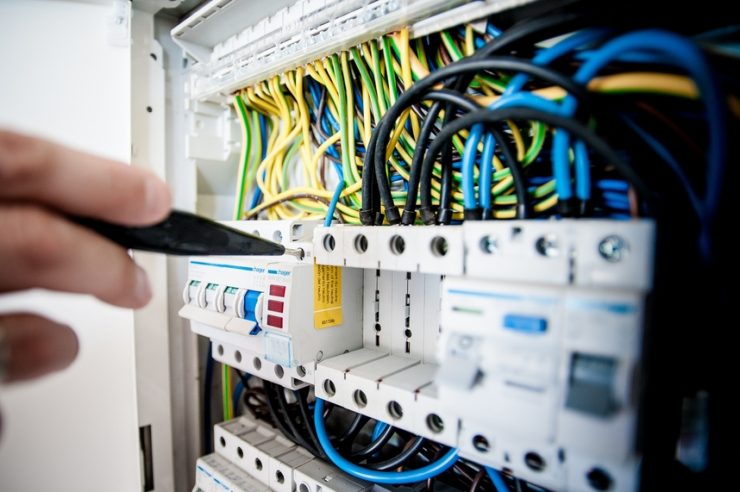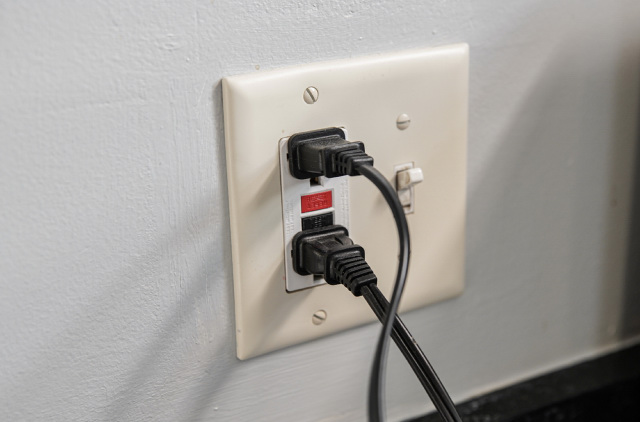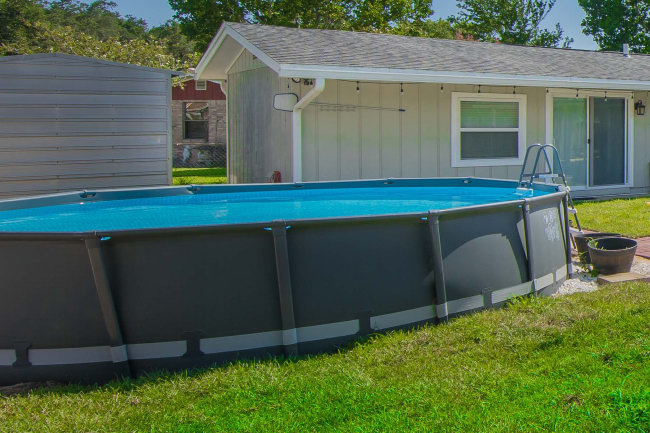If you’re about to install a new swimming pool, you may be wondering if the power outlet needs to have a ground-fault circuit interrupter (GFCI) fitted. Or perhaps you’re replacing your pool pump motor and there is currently no GFCI protection.
Do you need a GFCI? Let’s find out.
Disclaimer: Before we get started, please be aware that the laws and codes in your area may be different. The information in this article is provided solely for general interest and may not reflect legal requirements. Consult a qualified electrician in your local area for advice for your specific situation.

Article Contents
What is a GFCI?
First, let’s give a recap on what a ground-fault circuit interrupter is, or GFCI for short. A GFCI helps protect from electrical shock and can prevent fatal shocks. It is a device that protects the circuit from an earth fault or short circuit. It shuts off the electricity when it detects a fault.
Here’s an example of what a GFCI does.
Let’s say you were digging with a shovel and accidentally chopped through the underground cables for your pool pump. The action of the shovel chopping through the live and neutral wire creates a short circuit. Without a GFCI, if your shovel had a metal handle, you could get a fatal shock. A GFCI detects a fault like this and immediately shut the power off.
What Does the National Electrical Code Say?
First, let’s talk about the different building codes that must be followed. The National Electrical Code, NEC of NFPA 70 for short, is a general code that covers the standards and safe installation of electrical wiring and equipment in the USA.
It is not federal law. Rather, each state will either use this code as is or adopt its own version of the code. That’s why it’s important to check your local codes as the rules can change for swimming pool electrics, depending on which state you live in.
Article 640: Swimming Pools and Hot Tubs
Article 640 in the code sets out the GFCI requirements for swimming pools and hot tubs. As well as fountains and other installations.
This is what you need to know:
- Pool pumps 110V or 240V require GFCI protection
- Pool pump circuits less than 60 amps require GFCI protection
- Single and 3-phase pool pumps require GFCI protection
Here’s a quote directly from the NEC Article 680.21(C):
Outlets supplying all pool motors on branch circuits rated 150V or less to ground and 60 amperes or less, single or 3-phase, shall be provided with Class A ground-fault-interrupter protection.
Related Reading: Swimming Pool & Spa Electrical Requirements in New York State
What Type of GFCI is Needed?
There are multiple types of GFCI. Which one is needed for a swimming pool?
Swimming pool pumps must use a Class A personnel protection GFCI. These GFCI breakers trip at 6 milliamps or higher.
The following types of GFCI can be used for pools:
- Self-contained units
- Circuit breaker type
- Receptacle type
Self-contained or portable units
A self-contained or portable GFCI is can be used for a swimming pool pump. These units are cheap to buy and simply plug into the existing outlet.
They provide protection to any piece of equipment plugged into them. They do not protect the wires between the circuit breaker panel and the outlet.
Circuit Breaker GFCI for Pool Pumps
A circuit breaker GFCI is suitable for use for a swimming pool pump. This type of GFCI protects the entire circuit and is installed in the breaker box or panel.
In other words, the GFCI protects the wires all the way from the circuit board to the pool pump itself. Whereas GFCI receptacles or portable types, only protect the piece of equipment that is plugged in.
Circuit breaker GFCI types offer a higher level of protection and are safer. You’ll need an electrician to install this type.

Receptacle GFCI for Pool Pumps
A receptacle GFCI meets the NEC codes for pool pumps. With this type of GFCI, the GFCI is located in the outlet or receptacle. In addition to the socket, where the plug is plugged in, these types of GFCIs have a “reset” button and sometimes a “test” button.
If the GFCI trips, then the reset button needs to be pressed. The test button shuts off the power.
Receptacle GFCIs offer protection to only the device plugged in. They do not protect the wires between the outlet and the circuit breaker box.
Section 680.5 of the code says that a GFCI for a swimming pool pump.

What Voltage Pool Pumps Need a GFCI?
The national electric code says ALL single-phase and 3-phase pool pump motors between 110V and 250V, 15 amp and 20 amps, need to be GFCI protected. It doesn’t matter if they are single-speed, dual or 2-speed, or variable speed (VR) pumps, they must have GFCI protection.
This table shows pool pumps of various voltages and if they require GFCI protection:
| Pool Pump Voltage | GFCI Protection Required |
| 110 V AC | Yes |
| 115 V AC | Yes |
| 120 V AC | Yes |
| 208 V AC | Yes |
| 220 V AC | Yes |
| 230 V AC | Yes |
| 240 V AC | Yes |
Related Reading: Pool Pump Current (Amps) – 0.5 to 2.5 HP Motors
Can You Replace a Pool Pump Without a GFCI?
In older versions (before 2020) of the National Electrical Code, if the circuit or pool pump didn’t require a GFCI at the time of installation, it was acceptable to replace the pool pump or equipment without adding a GFCI.
The latest 2020 NEC code now requires that GFCI protection is used when replacing a pool pump, even if there were no requirements for GFCI protection at the time when the pump was originally installed.
Do Above Ground Pools Need a GFCI?
Above-ground pools do need a GFCI to comply with the NEC 2020 code. This doesn’t matter if they are portable temporary pools or permanent above-ground pools.

The pool pump must use a ground-fault circuit interrupter to comply.
Are There Any Exceptions?
Low-voltage motors which are run using a transforming or power supply are exempt and do not require a GFCI. The motor must not require grounding and the transformer must comply.
What if Your GFCI Keeps Tripping
It’s common for pool pumps to trip the GFCI or circuit breaker. And it can be frustrating if it keeps happening. Below is a list of reasons why that might occur:
- The windings in the pump motor are bad
- The pump motor or receptacle has moisture in it
- The pump bearings are bad
- The wires between the pump and GFCI circuit breaker have a fault
- The pump capacitor is bad
- The pump or receptacle hasn’t been wired correctly
- The GFCI circuit breaker is undersized
For details, see our article: How to Fix Pool Pump Tripping Circuit Breaker (Repeatedly)


Given the language “Outlets supplying all pool motors on branch circuits rated 150V OR LESS to ground AND 60 amperes or less, single or 3-phase….”
Why is a 230 V pool pump required to have a GFCI? I do not argue the safety of GFCI, merely the grammatical interpretation of the written code. Thank you.